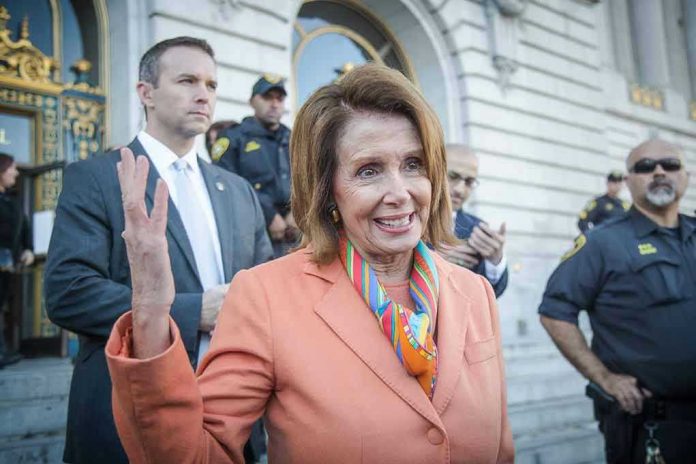
San Francisco’s most watched political seat is about to become a proving ground for the next generation of Democratic leadership, now that Nancy Pelosi is stepping aside—and the scramble to fill her shoes promises nothing short of a political spectacle.
Story Snapshot
- Nancy Pelosi’s retirement triggers the first open race for her San Francisco House seat in decades
- California’s “jungle primary” system could upend traditional party succession plans
- Ambitious Democrats and activist outsiders are already eyeing the contest
- The outcome may reshape not just local politics, but the national Democratic agenda
Pelosi’s Departure Leaves a Power Vacuum
Speaker Emerita Nancy Pelosi’s exit from Congress is not just the end of an era—it is an earthquake in the Democratic landscape. For over three decades, Pelosi’s grip on her San Francisco-based House seat kept ambitious challengers at bay. Her fundraising prowess, legislative acumen, and ironclad coalition-building made her not just a representative, but a national political titan. Now, with her retirement, the gate is open for the first time in a generation, inviting a frenzy of hopefuls to stake their claim in a district synonymous with liberal activism and Democratic dominance.
Thank you, San Francisco. pic.twitter.com/OP8ubeFzR6
— Nancy Pelosi (@TeamPelosi) November 6, 2025
California’s “jungle primary”—where all candidates, regardless of party, compete on the same ballot—adds an extra layer of unpredictability. The top two vote-getters, no matter their party, advance to the general election. This structure means the race will not be a simple coronation for any one Democrat, but a true test of message, money, and mobilization. With the city’s famously engaged electorate and a national spotlight, the contest is poised to be one of the most-watched political dramas of the coming year.
Who Dares to Succeed a Political Titan?
San Francisco’s Democratic bench is deep, but no single successor stands unchallenged. State senators, city supervisors, former mayors, and progressive firebrands are all rumored to be weighing bids. The field may include establishment figures seeking to inherit Pelosi’s legacy, as well as insurgents hoping to channel the city’s activist energy into a new era of representation. The city’s diverse communities—tech titans, LGBTQ+ leaders, union organizers, and neighborhood activists—will demand candidates with both local credibility and national vision.
Each contender faces a daunting question: How do you run in the shadow of a figure who shaped not just policy, but the very culture of the House? Some will argue for continuity, promising to defend Pelosi’s legislative priorities and her pragmatic approach. Others will make the case for generational change, calling for bolder action on housing, climate, tech accountability, and social justice. The race will be less about party labels—since Democrats dominate registration—than about which vision of Democratic politics the city, and perhaps the country, wants to embrace next.
National Stakes and the New Order
The outcome of this race will reverberate far beyond the Bay Area. Pelosi’s successor inherits a seat with outsize influence: a national fundraising base, a megaphone on progressive issues, and a direct line to party leadership. The winner will help shape the Democratic caucus’s direction at a moment of high volatility, with the party wrestling over its identity and strategy ahead of the next presidential cycle. The contest will also serve as a bellwether for how urban, left-leaning districts balance progressive idealism with pragmatic governance.
Early campaign skirmishes are already exposing fault lines. Some candidates will court the city’s business leaders and moderate voters, promising stability and experience. Others will lean into grassroots activism, demanding bold reforms and challenging corporate influence. Expect national groups—PACs, labor unions, activist networks—to pour resources into the race, seeing in it both symbolic and practical stakes for the future of the Democratic Party.
Can Anyone Fill the Pelosi Void?
No matter who wins, the next representative will face the impossible task of matching Pelosi’s stature. Her decades-long relationships, mastery of legislative procedure, and global profile will not be easily replicated. Yet the race itself will offer a rare window into how political power is transferred—and contested—in America’s most progressive city. As the campaign unfolds, every debate, endorsement, and misstep will be scrutinized for clues about the next chapter in the city’s—and the country’s—political evolution.
The contest to replace Nancy Pelosi will not just decide who speaks for San Francisco in Congress. It will reveal what kind of leadership the Democratic Party values in a new era—insider savvy, outsider energy, or something yet unimagined. For those who think politics is predictable, the coming months will offer a bracing reminder: in the post-Pelosi era, anything is possible.
Sources:
Who are the contenders for Nancy Pelosi’s long-held San Francisco seat?



